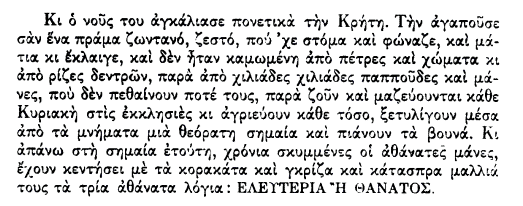
Worldwide shipping, since 1992!
View Cart
| About Us | Contact Us |
 |
Hundreds of Languages, Thousands of Products Worldwide shipping, since 1992! |
View Cart |
|
|
|||
| Languages | > | Greek (Modern) | Tweet |
Greek, the first great language of Western civilization, is considered by many to be the most effective and admirable means of communica-tion ever devised. Its lucidity of structure and concept, together with its seemingly infinite variety of modes of expression, render it equally suitable to the needs of the rigorous thinker and the inspired poet. We can only surmise how classical Greek must have sounded to the ear, but the spoken word was probably no less beautiful than the written. Greek-speaking people moved into the Greek Peninsula and adjacent areas from the Balkan Peninsula in the second millennium B.C. In time four distinct dialects evolved: Aeolic, Ionic, Arcado-Cyprian, and Doric. It was in the Ionic dialect that the epic poems of Homer, the Iliad and the Odyssey, appeared, perhaps in the 9th century B.C. with the rise of Athens in succeeding centuries, a dialect of Ionic known as Attic began to produce the great literature of the classical period. Attic became the dominant form of the language and the basis of the Koine, or common language, whose use passed far beyond the borders of present-day Greece. After the conquests of Alexander the Great it was spoken as far east as India, and later was adopted as a second language by the Roman Empire. The New Testament was written in the Koine and it is used by the Eastern Orthodox Church through the present day. Greek (Modern) is spoken/used in the following countries: Albania, Canada, Cyprus (Republic of), Greece, Italy, Macedonia, Turkey, United States of America. Language Family

Full of pity, his spirit embraced Crete. Crete was to him a living, warm creature with a speaking mouth and weeping eyes; a Crete that consisted not of rocks and clods and roots, but of thousands of forefathers who never died and who gathered, every Sunday, in the churches. Again and again they were filled with wrath, and in their graves they unfolded a proud banner and rushed with it into the mountains. And on the banner the undying Mother, bowed over it for years, had embroidered with their black and gray and snow-white hair the three undying words: FREEDOM OR DEATH. | ||||||||||||||||||||||||||||||||||||||||||||||||||||||||||||||||||||||||||
|
©1992-2025 World Language Resources, Inc.
All Rights Reserved.
2390 Crenshaw Blvd., #813, Torrance, CA 90501 USA Tel: 424-328-0063 About Us | Contact Us | Privacy Policy | Help Browse: Languages | Product Types | Countries |